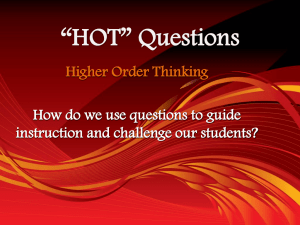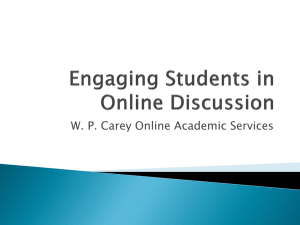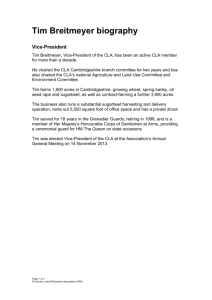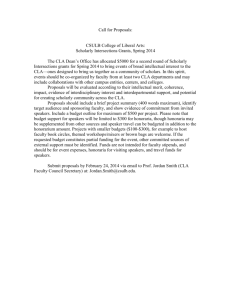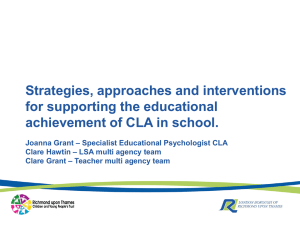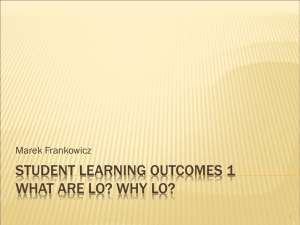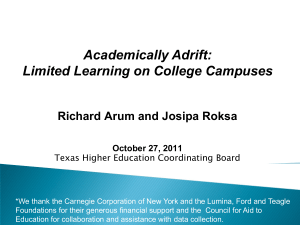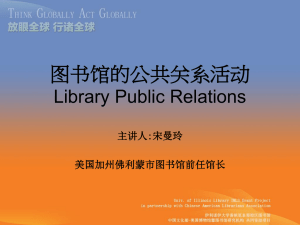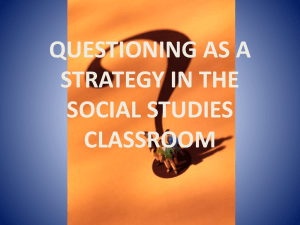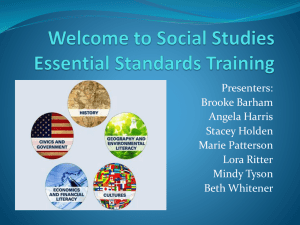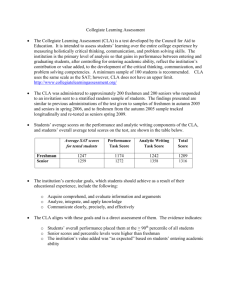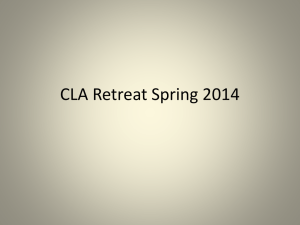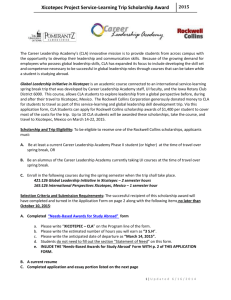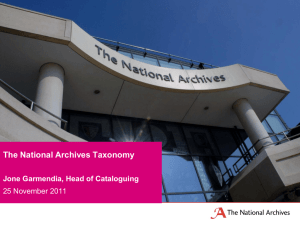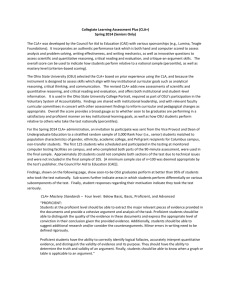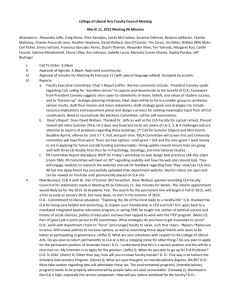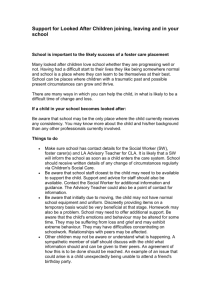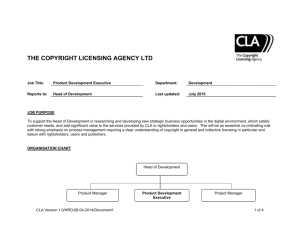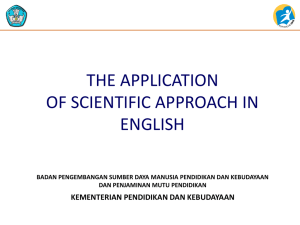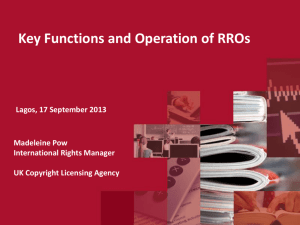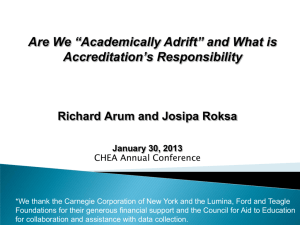CLA Curriculum Review 2014-2015
advertisement
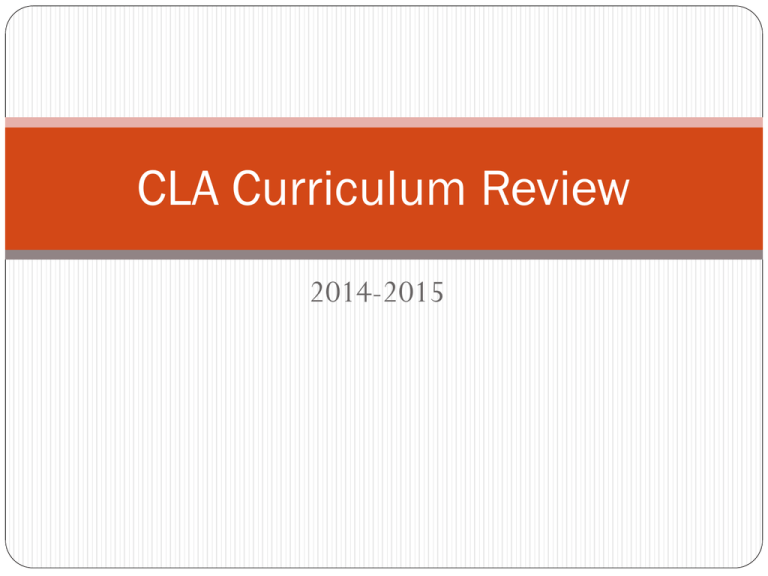
CLA Curriculum Review 2014-2015 Process Overview Fall 2014: Review the Curriculum November 3 Deadline Submit Recommendations for Curriculum Revision to the Office of the Dean Spring 2015: Revise the Curriculum March 2 Deadline Submit Course Revisions and Proposals to the Undergraduate Curriculum Committee and Office of the Dean Role of the Richard Wright Center Curriculum review and revision is a process, one that requires looking backward as we plan to move forward. Some of you have experience with curriculum review, some do not, and some of you are somewhere in between. Our role is to support you, wherever you are, as you go through the process: Who we are Kathi Griffin, Director & Tatiana Glushko, Coordinator What we do Facilitate discussions, seek resources, and offer feedback Agenda for today: Plan the Process as a Department Review Handouts: Identify where you are in the process – just beginning or somewhere along the way Define the mission of your department: Do you have one? If so, is it accurate, complete, and aligned with the CLA & University missions? If not, you will need a team to draft one. Create teams to meet benchmarks for Sept. 18 CLA meeting Complete List of Teams worksheet– to turn in at the end of the meeting a. Assign team leaders, recorders, and reporters b. Assign “Champions” on each team to attend to important issues (see ideas on worksheet) c. Assign each team a task (see ideas on worksheet - Gather Information from aspirant programs, from cohort programs, etc.) o Complete the Survey and turn it in before you leave o Sign up for Conversation on “Critical Thinking” In Your Department Ask General Questions What do we do well? What are our strengths? What do we do that we should not do? What should we do that we are not doing? What do we do that we can do better? Report findings to each other What do others do? How do they do it? Etc. Ask Specific Questions What do we want our graduates to know? What skills do we want our graduates to master? o See handouts: LEAP Goals and Bloom’s Taxonomy Grid & Verbs What makes us distinctive? Articulate Program Goals & Objectives – to be presented at the Sept. 18 CLA Meeting Goals flow from the Mission Statement They describe the knowledge and skills expected of graduates. Strategy: Identify 3-5 goals to help you write Overall Objectives Broad statements of meaningful expectations Achievable through experience in program Assessable through related objectives Objectives are brief, clear statements of learning outcomes Written in action words (see Bloom’s Taxonomy Verbs) Specify observable behavior in simple language Measurable Articulate Objectives for all undergraduate programs Majors – Minors – Concentrations CLA Meeting in September Report: Share Mission & Overall Objectives Plan to Review the Catalog Identify mechanism to help map courses Courses that “introduce” information & skills Courses that help students “practice” using information & skills Courses that help “reinforce” knowledge & skills Address Overall Objectives using Bloom’s Taxonomy For October: Review the Catalog Using your Overall Objectives, review each course: Should we keep the course? Should we keep it with “revision”? Should we “archive” the number for future consideration? Should we delete the course altogether? Record Your Process Record your decision about each course in a brief rationale (1-3 sentences) What is the purpose for each course? How does it fit in the overall taxonomy of the Major? Minor? Concentration? Note ideas for Overall Assessment – will be useful in Spring How will we measure student success? How will we measure our teaching effectiveness? Resource: Planning and Assessment Department Dr. McClung & Arnitra Hunter (x0203) Map Out Your Curriculum Sequence & Scaffold courses to help students learn, hone, and master skills to meet Overall Objectives See Tools for Using Bloom’s Taxonomy (grid in handouts) Identify Gaps in Content coverage and/or Skill development What course[s] do we need to add? And why? Do we need a new faculty line to meet our overall objectives? After October CLA Meeting: Write Up Your Recommendations Oct. 16, a template will be provided for submitting recommendations November 3 Deadline Submit Recommendations for Curriculum Revision to the Office of the Dean Before you leave today Please turn in your Team Worksheets Please complete the survey before you leave to help us provide meaningful support Please sign up for the Interdisciplinary Conversation on Critical Thinking If you think of something after you leave – today, tomorrow, next week, or next month – PLEASE let us know! kathi.r.griffin@jsums.edu tatiana.glushko@jsums.edu Quote from “Teaching the Mind Good Habits” Professors may assume that their students are stupid or suffer from a learning disability. Often the truth is much simpler: No one has ever bothered to teach them some basic but powerful skills of interpretation. As teachers, we need to remember what the world looked like before we learned our discipline's ways of seeing it.We need to show our students the patient and painstaking processes by which we achieved expertise. Only by making our footsteps visible can we expect students to follow in them. • Sam Wineburg, Professor of Education, Stanford University
